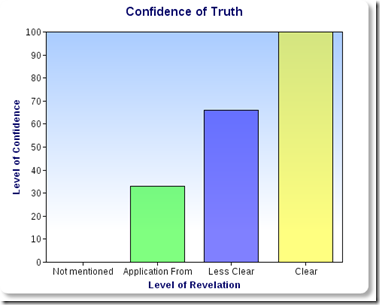I’ve been thinking a little about the sufficiency of Scripture. This doctrine is either neglected or misused. One denies the sufficiency of Scripture by completely outsourcing mental health issues, while the other misuses the sufficiency of Scripture by never outsourcing. One brother seems to put Scripture on par with other resources, while another brother believes that the Bible is the only book you need on your shelf and that it alone is needed to speak to all issues.
Using cancer as an example, I hope to show how to properly use the doctrine of the sufficiency of Scripture. First, consider this little graph I created:
This chart is a visual way of saying that where Scripture does speak it does so with authority. When Scripture speaks clearly (and therefore I am confident of my interpretation) then I should have absolute confidence in the truth that it declares. The less clearly that Scripture speaks on a topic the less confident I should be.
Cancer and the Bible
You’ve just received a most unwelcome diagnosis. That lump…it’s…cancer. Your mind races. A million questions flood your mind. You wonder where in the world God is in all of this. What does He have to say about cancer?
Now remember our rule: Where Scripture does speak it does so with authority.
What this means is that we test al truth claims by this. You will soon have options about treatment. Should you do chemo? What is the best way to fight this cancer?
The Bible is not going to answer those questions. It does not speak to what foods a cancer patient should eat. It doesn’t address issues like chemotherapy. Therefore, you should probably do what your doctor tells you. It’s not denying the sufficiency of Scripture to listen to your doctor and to get the help that you need.
Yet, the Bible is not silent when it comes to issues like cancer. The Scripture tell us that everything that happens in the life of a believer is designed by God for our good; namely, to bring us into greater conformity to Christ. (I’ve written more on this point here). We also know from Scripture that Jesus is our ultimate healer. We know that death is not the end of the story. We know that we are called to pray—even to call upon others to pray over us.
What happens if your doctor contradicts any of these points? What if he tells you, “prayer won’t help”? In this situation he is making a truth claim. And it is a truth claim that the Bible does speak to. Therefore, we measure his statement according to the Scriptures. God clearly calls us to pray and to cast our cares upon Him. Therefore, in this instance we don’t listen to our doctor because God, who has far more authority, has spoken.
Mental Health and the Bible
I don’t intend to flesh this out here, but my point in this article is not about cancer it is about the sufficiency of Scripture. There are some issues that are far more complex than cancer. Mental health is one of these issues. My hope in this article is to give us a way of thinking about how the sufficiency of Scripture relates to things like mental health.
The point is simple. The application is more tricky. Where Scripture speaks on issues of mental health it does so authoritatively. Where Scripture is silent (like brain chemistry) it is silent, and the sufficiency of Scripture doesn’t call us to make the Bible address issues that it does not address. Therefore, when we think through these matters it would do us well to humbly embrace a “both/and”.
We must not neglect the truth that Bible is sufficient. And we must not pretend that this means that the Bible speaks to every issue. Let us be bold where Scripture is bold…and no more.
